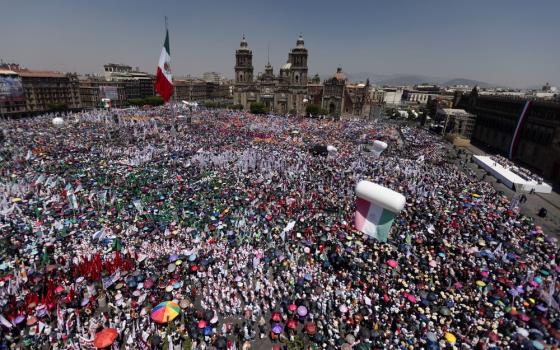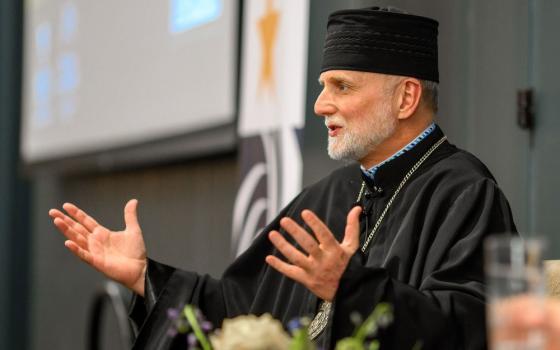Voter approval of a Washington state referendum legalizing same-sex marriage was greeted by a call for "real and respectful dialogue in our church" by the organization of Catholics supporting Referendum 74 -- and by bishops' statements to their sees for stronger catechesis on traditional and sacramental marriage.
"We are very proud that Catholics around the country followed their consciences rather than the rigid position of the hierarchy, and their voting reflected the spirit of Catholic social teaching," said the statement from Catholics for Marriage Equality Washington, alluding to other successful popular votes legalizing same-sex marriage in Maine and Maryland.
"Sadly, our bishops chose to ignore both Gospel and pastoral wisdom in their aggressive opposition to civil marriage for all God's children," the statement added. "They also failed to stand up for deep Catholic American respect for proper separation of church and state and for simple fairness to all."
In a statement released the day after the balloting, when it seemed likely the marriage equality law would be ratified 52 percent to 48 percent, Seattle Archbishop J. Peter Sartain said he was "disappointed that so many voters failed to recognize marriage between a man and a woman as the natural institution for the permanent, faithful covenant of love for a couple, for bringing children into the world, and for nurturing and educating those children."
"Despite the election results, the campaign has been an opportunity for the church to reaffirm its consistent teaching on marriage," Sartain wrote. "The campaign to preserve marriage as a union between a man and a woman represents a starting point for a long-term effort to educate Catholics about its meaning and purpose. The church offers a vision of marriage and family life that enriches our communities and society and we remain committed to that vision while respecting the dignity of all persons."
Sartain, Spokane Bishop Blase J. Cupich, Yakima Bishop Joseph J. Tyson, Seattle Auxiliary Bishop Eusebio Elizondo and the Washington State Catholic Conference were high-profile opponents of Referendum 74
In a website statement Wednesday, Tyson noted that almost two-thirds of the rural Yakima diocese's residents "clearly and resoundingly heard our message in Central Washington" in rejecting Referendum 74.
However, "voter-rich King County" overwhelmed the popular vote, he said. King County, which includes Seattle, is the state's largest county.
"I intend to work with the other bishops of the state and in the region to continue to uplift marriage between one man and one woman as the best proposal for everyone in our society," Tyson said.
Like Sartain, he said the campaign had been an opportunity for the church to articulate its teaching on marriage.
“There is one major unresolved issue,” said Spokane's Cupich in a statement released Nov. 9. “The state has a responsibility to protect and support parents who marry and take on the risks and responsibilities of bringing children into the world. Does the state now intend to walk away from its historic role of upholding the unique contribution which a man and woman make to society when they marry and generate new life, as only they can, thereby continuing the human race? If not, what does it intend to do in this regard?”
Cupich said he felt “the very close margin approving Referendum 74, indicates that acceptance of the redefinition of marriage is troubling to a significant number of citizens.” He added, though, that the Referendum 74 contest “demonstrated that hotly contested issues can be argued with respect and civility.”
“While there were a few regrettable instances of demeaning language towards homosexual people and charges of bigotry against opponents of Referendum 74, these were the exception,” he stated.
The statement from Catholics for Marriage Equality Washington, released early Thursday, also:
- suggested that "one result of this election will likely be changes in future giving patterns of Catholics ... upset at the amount of Catholic staff resources and dollars that bishops and the Knights of Columbus dedicated to opposing this civil legislation";
- said, "Many issues remain to be dealt with inside the Catholic family in regard to marriage, sexuality and whom we are including at the Eucharistic tables of our parishes"; and
- said the referendum campaigns revealed "a serious gap between the hierarchy's statements and the lived experience of the majority of Catholic families."
Sacramental marriage in the United States has dropped dramatically in the last generation, almost 60 percent since 1972, according to the U.S. bishops' Secretariat for Laity, Family Life and Youth.
While the number of U.S. marriages celebrated in the church fell from 415,487 in 1972 to 168,400 in 2010, the U.S. Catholic population increased by almost 17 million.
[Dan Morris-Young reports for NCR from Washington state. His email address is dmyoung@ncronline.org.]



